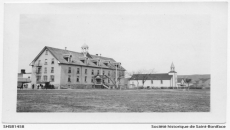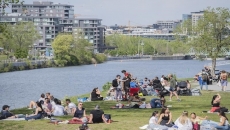Federal officials' apparent lack of concern about the impact central bank actions have on managing government debt, shown in internal documents, is about to face a test as the Bank of Canada is poised to slow the pace of its bond-buying program.
The briefing note from late last year appears to gloss over the bond-buying program despite the extraordinary effect it was having on debt yields.
The central bank has encouraged interest rates at historic lows since the pandemic began by keeping its key rate at near-zero and purchasing federal bonds at an unprecedented pace as part of its first foray into the world of quantitative easing, or QE for short.
The Bank of Canada is widely expected to reduce its weekly purchases of federal bonds as part of a scheduled rate announcement on Wednesday morning.
If it pulls back from purchases, demand for federal bonds would drop and rates would rise, which could affect the cost for the federal government to refinance billions in debt coming due.
Rebekah Young, director of fiscal and provincial economics at Scotiabank, says the connection to the debt means the central bank will have to clearly explain any changes in bond purchases so markets don't worry decisions are being made in order to help federal finances.
"Markets also need to feel that the central bank is independent, because that's how inflation expectations are anchored," Young said.
"If there's a concern that the Bank of Canada is maintaining its QE program to keep the government's financing costs low, that would really spook markets, because they would think, 'OK, they're now they're driven by keeping those public debt charges down."
The federal debt has shot up over the course of the pandemic as the treasury pumped out billions to replace lost income for workers, and subsidies for businesses to cover wages, utilities and rent.
With the debt set to top $1.2 trillion this fiscal year, the Liberals have looked to lock in new debt in long-term bonds, trying to take advantage of historically low interest rates.
A Dec. 22 briefing note to the top official at the Finance Department noted that managing the debt needed to take into account "the risks associated with exogenous changes" to the quantitative easing program, but also any changes to the key policy rate.
The key policy rate at the central bank has been at 0.25 per cent since the onset of the pandemic one year ago, and governor Tiff Macklem has said the bank doesn't foresee raising the trend-setting rate until later next year.
The longer the rate stays low, the longer the federal government "can maintain its progressive approach to lock in more of its debt into long-term issuances," reads one slide in a presentation attached to the Dec. 22 briefing note,
The document, obtained by The Canadian Press under the Access to Information Act, also warned of the need to respond to "any unexpected shocks."
The shocks could be anything from a spike in cases in the fall or the spread of new variants that could require renewed lockdowns, to conditions improving faster than expected.
Elliot Hughes, a one-time adviser former finance Bill Morneau and now with Summa Strategies, said either could make the bank rethink the timeline to raise rates.
"I suspect that the bank isn't going to want to make any drastic moves until they've got a really good sense of what the world looks like," Hughes said.
The bank's senior decision-makers believe the economy should rebound strongly starting this summer, even as growth in the first half of the year looks to fall short of the bank's forecasts.
In a note Friday, CIBC chief economist Avery Shenfeld said the Bank of Canada is unlikely to change its pledge to keep rates on hold until the second half of 2022.
"Not to say that the Bank (of Canada) pays attention to elections, but the government will also be happy if its central bank avoids rattling Canadians about earlier rate hikes, if a September election is in the offing," Shenfeld wrote.






